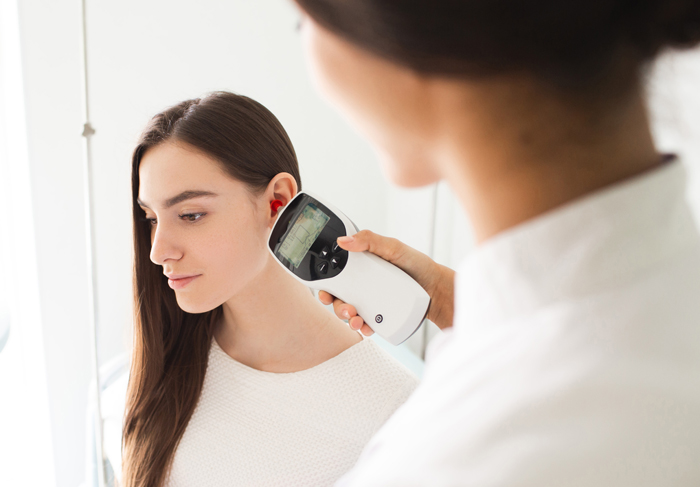Best Audiometry Treatment & Diagnostics in Chembur, Mumbai
Hearing or auditory perception is one of the most important senses for us humans. Imagine how difficult life is for those who cannot hear. For people who cannot hear, their brain is unable to perceive sound through the vibrations produced in the internal ear.
If you are suffering from loss of hearing or any difficulty in perception of sound whether mild, moderate or severe, visit an audiometry hospital near you. You should know that hearing loss is treatable. Visit an audiometry doctor near you.

What is audiometry?
It is a technique or test that is performed to measure one’s ability to hear sound. Audiometry is performed when hearing loss is suspected. Audiometry test is a painless, non-invasive approach to detect different frequencies of sound that a person can hear, eventually assessing if a person can hear or not and if there is a need for a hearing aid. Audiometry is done by well-trained audiometry doctors in Mumbai.
What are the types of audiometry?
Audiometry tests are non-invasive and safe; these tests are performed by audiometry specialists in Mumbai. The different audiometry tests are:
- Pure tone audiometry - Air conduction is used to measure hearing efficacy at different frequencies. The frequencies range from 250 to 8000 Hz. A patient is made to wear headphones and is instructed to press a button when he/she hears a tone of a certain frequency. The results are plotted on a graph by an audiometer.
- Speech audiometry - This test is used to measure the speech reception threshold. The aim is to identify the faintest speech and repeat 50 percent of the speech.
- Self-recording audiometry - The intensity and frequency of the audiometer are automatically changed in a forward or backward direction.
- Bone conduction testing - This audiometry test measures the inner ear's response to sound. A vibrating conductor is placed behind the ear, sending vibrations to the internal ear through a bone. It is used to determine the type of hearing loss.
- Acoustic reflex testing - This audiometry test is used to determine the location of the hearing problem by measuring the involuntary muscle contractions of the middle ear.
- Otoacoustic emissions - It is used to determine the location of the blockage, location of the damage (middle ear or hair cell damage). Tiny probes are used to perform this test along with a microphone to measure the response of the cochlea.
- Tympanometry - In this audiometry, the movements of the eardrums are measured against air pressure to determine if there are any perforations in the eardrum, wax or fluid build-up or any tumor.
When do you need to see a doctor?
If you have any type of hearing issue, consult an audiometry specialist near you.
You can request an appointment at Apollo Spectra Hospitals, Chembur, Mumbai.
Call 1860 500 2244 to book an appointment.
How is audiometry performed?
Audiometry tests are performed in a quiet soundproof room. The procedure depends on the type of audiometry test performed. For pure tone audiometry, the patient is made to wear a headphone and is subjected to a wide range of sound frequencies and measured in dB. In speech audiometry, the patient's ability to understand a minimum of 50 percent of speech from the background is measured. The rest of the audiometry tests and how they are performed are mentioned above.
How do you prepare for audiometry?
Before going for an audiometry test, keep in mind the following points:
- Clean your ears a day before the test and make sure your ear is free from wax.
- If you are suffering from a cold or flu, let your doctor know as this may provide false readings. You should get your appointment rescheduled in such a situation.
- Try to remain still and quiet while the test is being performed.
- You should also avoid exposure to loud sounds, noise or music.
What are the risk factors associated with audiometry?
Audiometry is a non-invasive test performed to measure the ability to hear sound. It does not pose any risk.
What can you expect from audiometry?
- A complete case history recording and form-filling
- Evaluation of your case by a practitioner taking into account your hearing condition, medical history and lifestyle
- Diagnosis and treatment of your hearing inability and balance issues if present
- Dispensing hearing aids or other devices
What are the possible results of audiometry?
The results of the audiometry are depicted on the audiogram with the following types of readings:
- Normal - <25 dB HL
- Mild - 25 to 40 dB HL
- Moderate - 41 to 65 dB HL
- Severe - 66 to 99 dB HL
- Profound - >90 dB HL
(*HL - hearing level)
Conclusion
Hearing loss is treatable. All you have to do is consult an audiometry doctor near you and get an audiometry test done. Audiometry tests help distinguish and figure out the damaged area of the ear and provide you with the necessary treatment.
Audiometry is needed to test whether your hearing ability is functional or not or how well you can hear. Apart from this, it also measures the tone and intensity of the sound perceived by you and helps to diagnose any balance-related issues.
Typically there are no risks associated with audiometry. However, if the auditory brainstem is subjected to sedation, then there is the possibility of side effects caused by the sedative used. Otherwise there are no risks.
Yes, definitely audiometry can be performed at an early age. Ideally, audiometry can be performed as early as 3 months of age as by this time a baby can recognize its parent's voice.
Symptoms
Our Doctors
DR. RINAL MODI
BDS...
| Experience | : | 8 Yeras Experience |
|---|---|---|
| Speciality | : | Dental and Maxillofa... | Location | : | Tardeo |
| Timings | : | Mon - Sat : 10:00 AM... |
DR. DIPAK DESAI
MBBS, MS, DORL...
| Experience | : | 21 Yeras Experience |
|---|---|---|
| Speciality | : | ENT, Head and Neck S... | Location | : | Tardeo |
| Timings | : | Available by prior a... |
DR. KEYUR SHETH
DNB (Med), DNB (Gast...
| Experience | : | 7 Yeras Experience |
|---|---|---|
| Speciality | : | General Surgery & Ga... | Location | : | Chembur |
| Timings | : | Mon to Fri : 2:00 PM... |
DR. MEENA GAIKWAD
MBBS, MS (ENT)...
| Experience | : | 8 Yeras Experience |
|---|---|---|
| Speciality | : | ENT, Head and Neck S... | Location | : | Chembur |
| Timings | : | Mon - Sat : 6:30 PM ... |
DR. SHASHIKANT MHASHAL
MBBS, MS (ENT)...
| Experience | : | 22 Yeras Experience |
|---|---|---|
| Speciality | : | ENT, Head and Neck S... | Location | : | Chembur |
| Timings | : | Friday : 8:00 PM to ... |
DR. GANGA KUDVA
MBBS, MS (ENT) , DNB...
| Experience | : | 12 Yeras Experience |
|---|---|---|
| Speciality | : | ENT, Head and Neck S... | Location | : | Tardeo |
| Timings | : | Available by prior a... |
DR. JAYESH RANAWAT
MBBS, MS, DNB, FCPS...
| Experience | : | 16 Yeras Experience |
|---|---|---|
| Speciality | : | ENT, Head and Neck S... | Location | : | Tardeo |
| Timings | : | Available by prior a... |
DR. MITUL BHATT
MBBS, MS (ENT), DNB ...
| Experience | : | 12 Yeras Experience |
|---|---|---|
| Speciality | : | ENT, Head and Neck S... | Location | : | Tardeo |
| Timings | : | Mon - Sat : 2:30 PM ... |
DR. NINAD SHARAD MULEY
BDS, MDS...
| Experience | : | 9 Yeras Experience |
|---|---|---|
| Speciality | : | Dental and Maxillofa... | Location | : | Chembur |
| Timings | : | Mon - Sat : 9:00 AM ... |
DR. ANKIT JAIN
MBBS, MS (ENT)...
| Experience | : | 14 Yeras Experience |
|---|---|---|
| Speciality | : | ENT, Head and Neck S... | Location | : | Tardeo |
| Timings | : | Mon, Wed, Fri : 4:00... |
DR. PRASHANT KEWLE
MS (ENT), DORL...
| Experience | : | 17 Yeras Experience |
|---|---|---|
| Speciality | : | ENT, Head and Neck S... | Location | : | Chembur |
| Timings | : | Mon - Sat : 4:00 PM ... |
DR. SHRUTI SHARMA
MBBS,MS(ENT)...
| Experience | : | 15 Yeras Experience |
|---|---|---|
| Speciality | : | ENT, Head and Neck S... | Location | : | Tardeo |
| Timings | : | "Mon - Fri : 11:00 A... |
DR. ROSHNI NAMBIAR
MBBS, DNB (ENT)...
| Experience | : | 19 Yeras Experience |
|---|---|---|
| Speciality | : | ENT, Head and Neck S... | Location | : | Chembur |
| Timings | : | Mon - Sat : 12:30 PM... |
DR. YASH DEVCKAR
MBBS, MS (ENT)...
| Experience | : | 11 Yeras Experience |
|---|---|---|
| Speciality | : | ENT, Head and Neck S... | Location | : | Chembur |
| Timings | : | Mon - Sat : 9:30 AM ... |
DR. SURBHI P. BHAGAT
MBBS, MD - Anaesthes...
| Experience | : | 21 Yeras Experience |
|---|---|---|
| Speciality | : | Pain Management... | Location | : | Tardeo |
| Timings | : | Mon to Sat : 01:00 P... |
Our Top Specialities
NOTICE BOARD
CONTACT US
CONTACT US
 Book Appointment
Book Appointment










.jpg)






.svg)
.svg)
.svg)
.svg)








